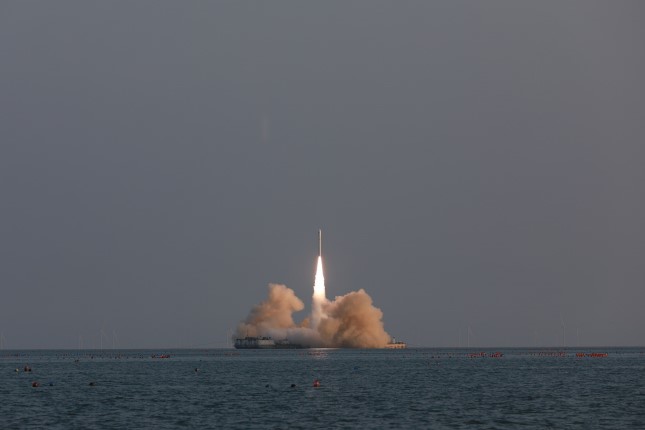This comes as Japan has blindly followed Washington's lead in containing China. Chinese analysts said Japan's unreasonable move will make its chip industry face a Waterloo again, as Japanese chipmakers are striving to avoid repeating the failure in the Japan-US chip war more than three decades ago.
Chinese analysts said China will take all necessary measures to safeguard its own interests, adding that the country has abundant countermeasures including potential bans on export of strategic raw materials and restrictions on foreign chipmakers that aid the US' malicious crackdown on China, and the countermeasures "might come out soon."
Japan announced in late March a draft revision to a ministry ordinance on its Foreign Exchange and Foreign Trade Act, adding 23 chip-manufacturing items that require government approval for export, which includes equipment for cleaning, checkups and lithography, a technology essential in producing cutting-edge chips.
Japan's move follows the Netherlands' new controls on exports of some advanced semiconductor tools on June 30 amid US pressure to cut China from key chip-making equipment. In October last year, the US rolled out a sweeping set of export curbs on shipments of certain high-end chips to China.
"The export control measures adopted by the Japanese government will bring greater uncertainties and damage to the global semiconductor industry that has been seriously disrupted by the US. However, Japan's moves will backfire," Da Zhigang, director of the Institute of Northeast Asian Studies at Heilongjiang Provincial Academy of Social Sciences, told the Global Times on Sunday.
With no access to the huge Chinese market, Japanese chipmakers such as Nikon Corp and Tokyo Electron Ltd could suffer significantly, leading to less profit to support their innovation and technology iteration and thus undermining Japanese companies' global competitiveness, Da said.
The two firms didn't comment when reached by the Global Times. However, it's reported that Japanese industry groups and enterprises submitted their concerns and grievance to the Japanese government which didn't respond to the reasonable demands of the industry.
The Chinese mainland is the largest export market for Japan's semiconductor equipment manufacturers, with such exports reaching 820 billion yen ($5.7 billion) in 2022, accounting for around 30 percent of Japan's total chip-making equipment exports, official data showed.
The Chinese side has repeatedly reiterated its firm opposition to Japan's political interference in the semiconductor industry. Shu Jueting, a spokesperson for China's Ministry of Commerce, on July 13 blasted Japan has politicized economic issues and overstretched the concept of national security to intentionally weaken cooperation with China in semiconductors and related industries.
"As one of the major producers of information and technology products as well as cars, China needs to import large quantities of chips to meet downstream production. This is normal commercial practice and part of the world's manufacturing and trade. There is no reason for Japan to invoke national security exceptions to defend its export control measures," said Tu Xinquan, dean of the China Institute for WTO Studies at the University of International Business and Economics in Beijing.
Reliance on China
The global semiconductor industrial chain is one that embodies broad collaboration and global division of labor. Japan and the Netherlands' joining in the US' strategy of excluding China from the global semiconductor industrial chain may unexpectedly lead global chipmakers to re-establish industrial chains to isolate the US, Japan and the EU, Ma Jihua, founder of Beijing DARUI Management Consulting Co and a veteran industry analyst, told the Global Times.
In general, US firms such as Qualcomm and Intel lead in chip design, European companies such as ASML provide advanced manufacturing equipment, Japan is also superior in semiconductor equipment in addition to materials and hardware integration, while South Korea's Samsung and SK Hynix are leading memory chip makers and the island of Taiwan dominates the foundry market, said Ma.
China enjoys advantages in upstream raw material products, components and packaging. China was the largest single market for semiconductors in 2022, with sales of $180.4 billion, about one-third of the global total, according to the SIA.
"Losing access to the massive Chinese market will make existing Japanese chipmakers face another Waterloo," Da said, referring to the rapid decline of Japan's semiconductor industry and the failure of previous Japanese chip giants such as Toshiba due to a chip war that the US initiated in 1980s.
Despite the Japanese government's export restriction measures, Japanese semiconductor firms such as Nikon and Canon displayed their cutting-edge products at the SEMICON China closed in Shanghai on July 1.
The mounting US chip crackdown on China has already started to backfire. Major US chip companies have reportedly urged the Biden administration to refrain from further restrictions on chip exports to China in order to protect their profits in the world's largest commercial market for chips.
While caught in the US' export curbs on China, ASML CEO Peter Wennink said during earnings conference call on Wednesday that the global demand for deep ultraviolet (DUV) lithography systems has been influenced by macroeconomic factors, but the Chinese market has absorbed some of the declining demand in other markets over the past two years.
Strive for breakthroughs
Amid a push for technology self-reliance and fostering domestic replacements to break through the US' containment and encirclement, the second phase of the National Integrated Circuit Industry Investment Fund Co, also known as the "Big Fund II," has invested heavily in China's semiconductor manufacturing, equipment and related materials and other key links, with a notable increase in the upstream, so as to break bottlenecks as soon as possible and fuel domestic demand.
"Recently, we have surpassed US chip giant Nvidia's high-end chips in a single benchmark for image recognition on the international stage. This is a result of a step-by-step process, as we follow a different technological path to enhance performance by optimizing algorithms and reducing computational load," a manager of a domestic startup AI chipmaker told the Global Times in a recent interview on condition of anonymity.
Over the past five years, there has been growing demand for domestic replacements, strengthened coordination between upstream and downstream companies as well as growing importance the authorities and investors attached to the high-tech sector. I believe Chinese chips will be able to compete with those made in the US one day, said the manager.
Chinese Commerce Ministry recently held a seminar with major domestic chipmakers, discussing the impact of US and its allies' chip crackdown on China, calling for the Chinese government to take effective measures to deal with, domestic news site Caixin reported.
The ministry didn't reply for comment on Sunday.
"China has abundant countermeasures. For example, a potential ban on critical raw materials for manufacturing chips and targeted measures on foreign chip firms that follow the US and Japanese governments' moves in containing China," Ma said, noting that "these measures may come out soon."
Photo: A worker tests semiconductor chips in a factory in Yancheng, East China's Jiangsu Province, on April 14, 2023 © VCG.
Source: The Global Times.
































